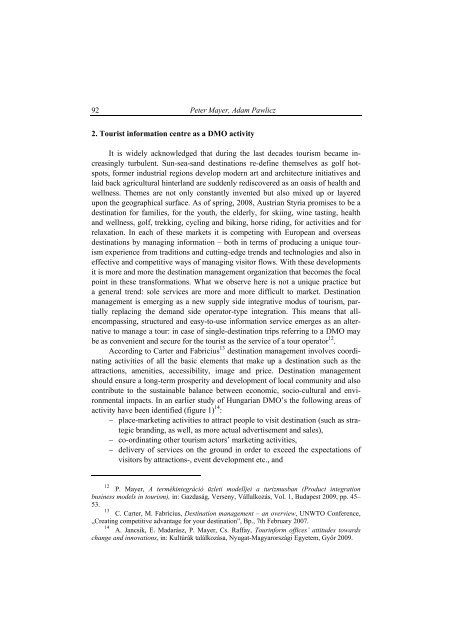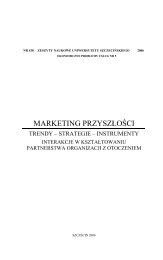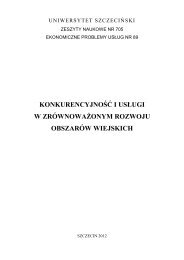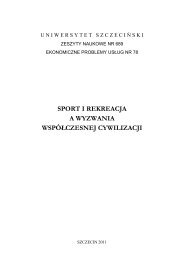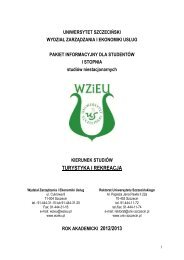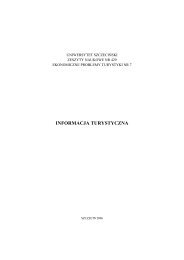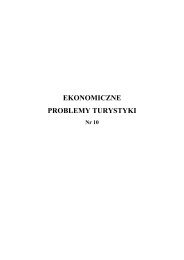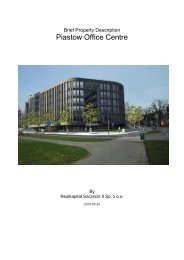Zeszyt naukowy - caÅoÅÄ - WydziaÅ ZarzÄ dzania i Ekonomiki UsÅug
Zeszyt naukowy - caÅoÅÄ - WydziaÅ ZarzÄ dzania i Ekonomiki UsÅug
Zeszyt naukowy - caÅoÅÄ - WydziaÅ ZarzÄ dzania i Ekonomiki UsÅug
Create successful ePaper yourself
Turn your PDF publications into a flip-book with our unique Google optimized e-Paper software.
92<br />
Peter Mayer, Adam Pawlicz<br />
2. Tourist information centre as a DMO activity<br />
It is widely acknowledged that during the last decades tourism became increasingly<br />
turbulent. Sun-sea-sand destinations re-define themselves as golf hotspots,<br />
former industrial regions develop modern art and architecture initiatives and<br />
laid back agricultural hinterland are suddenly rediscovered as an oasis of health and<br />
wellness. Themes are not only constantly invented but also mixed up or layered<br />
upon the geographical surface. As of spring, 2008, Austrian Styria promises to be a<br />
destination for families, for the youth, the elderly, for skiing, wine tasting, health<br />
and wellness, golf, trekking, cycling and biking, horse riding, for activities and for<br />
relaxation. In each of these markets it is competing with European and overseas<br />
destinations by managing information – both in terms of producing a unique tourism<br />
experience from traditions and cutting-edge trends and technologies and also in<br />
effective and competitive ways of managing visitor flows. With these developments<br />
it is more and more the destination management organization that becomes the focal<br />
point in these transformations. What we observe here is not a unique practice but<br />
a general trend: sole services are more and more difficult to market. Destination<br />
management is emerging as a new supply side integrative modus of tourism, partially<br />
replacing the demand side operator-type integration. This means that allencompassing,<br />
structured and easy-to-use information service emerges as an alternative<br />
to manage a tour: in case of single-destination trips referring to a DMO may<br />
be as convenient and secure for the tourist as the service of a tour operator 12 .<br />
According to Carter and Fabricius 13 destination management involves coordinating<br />
activities of all the basic elements that make up a destination such as the<br />
attractions, amenities, accessibility, image and price. Destination management<br />
should ensure a long-term prosperity and development of local community and also<br />
contribute to the sustainable balance between economic, socio-cultural and environmental<br />
impacts. In an earlier study of Hungarian DMO’s the following areas of<br />
activity have been identified (figure 1) 14 :<br />
place-marketing activities to attract people to visit destination (such as strategic<br />
branding, as well, as more actual advertisement and sales),<br />
co-ordinating other tourism actors’ marketing activities,<br />
delivery of services on the ground in order to exceed the expectations of<br />
visitors by attractions-, event development etc., and<br />
12<br />
P. Mayer, A termékintegráció üzleti modelljei a turizmusban (Product integration<br />
business models in tourism), in: Gazdaság, Verseny, Vállalkozás, Vol. 1, Budapest 2009, pp. 45–<br />
53.<br />
13<br />
C. Carter, M. Fabricius, Destination management – an overview, UNWTO Conference,<br />
„Creating competitive advantage for your destination”, Bp., 7th February 2007.<br />
14<br />
A. Jancsik, E. Madarász, P. Mayer, Cs. Raffay, Tourinform offices’ attitudes towards<br />
change and innovations, in: Kultúrák találkozása, Nyugat-Magyarországi Egyetem, Győr 2009.


